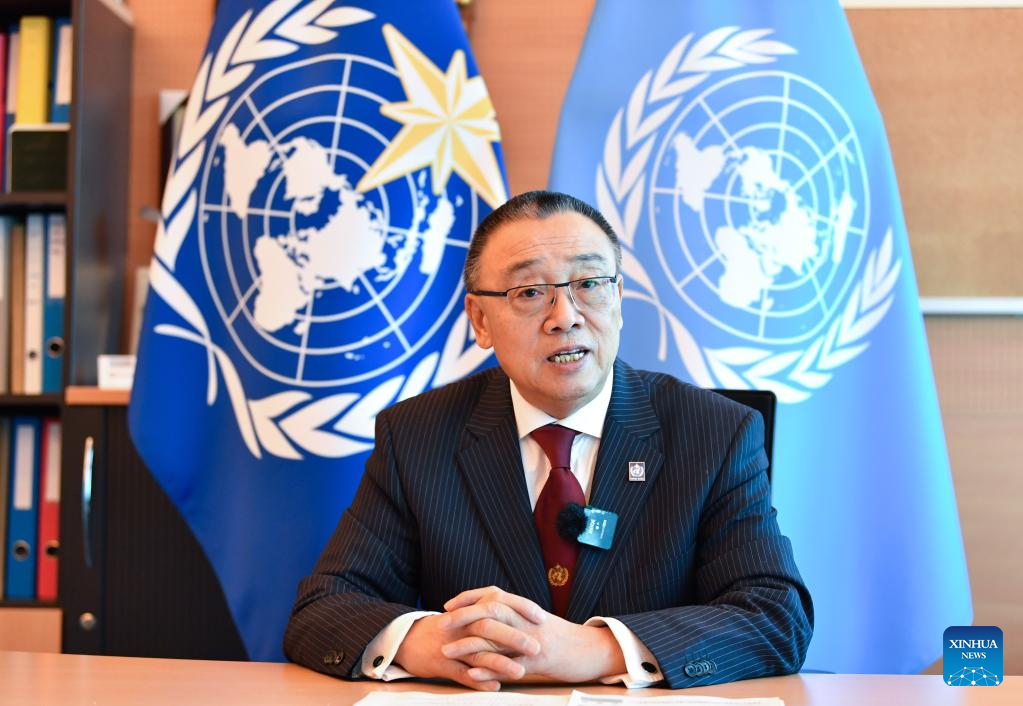
Zhang Wenjian, assistant secretary-general of the World Meteorological Organization (WMO), speaks in an interview with Xinhua News Agency in Geneva, Switzerland, Nov. 19, 2022. China's advancements in meteorological science and technology have benefited not only its own population but also the rest of the world, Zhang has said.(Xinhua/Lian Yi)
GENEVA, March 23 (Xinhua) -- China's advancements in meteorological science and technology have benefited not only its own population but also the rest of the world, Assistant Secretary-General of the World Meteorological Organization (WMO) Zhang Wenjian has said.
China's meteorological science and technology has reached a world-leading level, especially in meteorological satellites, Zhang said in an interview with Xinhua.
Zhang noted that the country's meteorological concepts feature openness, inclusiveness and mutual sharing.
Since the restoration of its lawful seat at the WMO in 1972, China's role in the organization has gone through four stages: integration, contribution, participation and leadership, according to Zhang.
After the initial procedural integration, China quickly contributed to the WMO's observation systems, which rely on international cooperation to form a global operational system.
"Without data from the WMO, no country can make weather forecasts beyond one day," said Zhang. "With the observation data contributed by China, the global weather data observation network could then match its name. It was crucial for the WMO and global weather forecasting that meteorological data from China's 9.6 million square km of territory be shared globally."
Over the past 20 years, China has quickly taken a leading role within the WMO, thanks to its advancement in science and technology and meteorological development concepts.
According to Zhang, the WMO needs data from about 1,000 vertical atmospheric observation balloons daily, with China contributing about 100, or 10 percent. Meanwhile, the WMO satellite program coordinates about 30 operational satellites, with seven or eight from China. These basic observation systems are the most powerful tools for monitoring meteorological hazards.
Another bright spot of Chinese technology has been in meteorological satellites. In 2017, the WMO and seven countries in Asia and Oceania, including China, Japan, South Korea, Indonesia, Australia, Russia and India, agreed on an Asia and Oceania meteorological satellite user-sharing mechanism, which facilitates providing critical meteorological satellite services to more countries in the Southern Hemisphere that do not have their own meteorological satellites.
"In the event of major catastrophic weather events or major international political incidents, such a mechanism can provide meteorological satellite service in an observation frequency of every minute instead of every half an hour to respond more accurately to weather conditions such as typhoons," Zhang said.
The WMO has been calling on countries with meteorological satellites to provide observation services tailored to other countries experiencing major meteorological events. China was the first to respond to the call and has now signed agreements with 28 countries to provide meteorological observation service when needed.
Behind all this are the advanced technology and increasing quantity of Chinese meteorological satellites over the past two decades.
Zhang said China now has four geostationary orbiting meteorological satellites in operation, covering about half of the Earth's surface area. Its Fengyun-4B meteorological satellite can provide a high-resolution observation of 250 meters every minute.
Zhang said China's meteorological satellites have benefited the world, taking the G20 summit in Indonesia last year as an example. To ensure the flight safety of the participating heads of state, he said that China provided tailored meteorological satellite observation service at the request of Indonesia for the best weather forecast and observation results.
"It showed that China's meteorological technology not only has served its national economy but also the security in major international political events," Zhang said.
On World Meteorological Day last year, UN Secretary-General Antonio Guterres called for establishing a UN weather and climate early warning system within the next five years to protect every person on Earth against increasingly frequent extreme weather and climate change events.
"China has been persistently assisting the least developed countries in meteorological service, helping to train personnel and establish early warning systems," said Zhang.
"Early warning is highly dependent on observational data. On average, the WMO collects data from about 10,000 ground-based stations per day, of which about 500 are contributed by China, accounting for about 5 percent of the global total," said Zhang.
Since 2013, China has assisted seven African countries in building ground-based meteorological observation networks, disaster mitigation and prevention systems, and offshore satellite reception systems with the WMO's coordination.
"China's unremitting assistance in meteorological services, especially to the least developed countries, has been recognized and appreciated by the majority of developing countries," Zhang said, adding that the WMO hopes that all countries with meteorological satellites follow suit by providing timely cooperation to developing and least developed countries. ■



